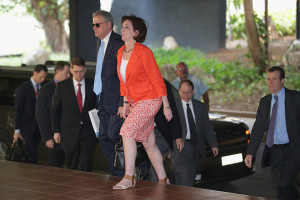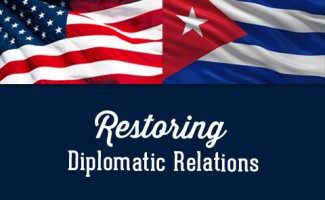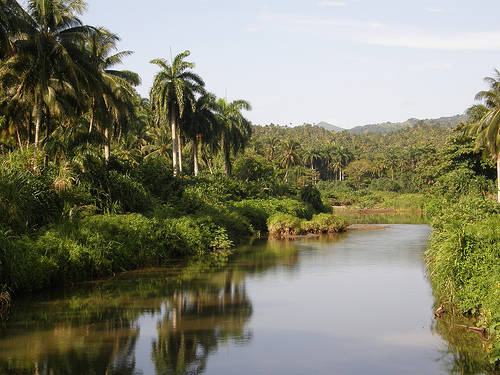END OF “COLD WAR” between Cuba and the US: Opens the Future? .
After 54 years of bitterness and isolation, the US government and Cuba Monday restored diplomatic relations and reopen their embassies in Washington and Havana, eliminating the last vestige of the Cold War on the continent.
For now, only the Cuban government hoisted its flag in Washington, in a ceremonial act which will have a small US delegation led by Deputy Secretary of State for Latin America, Roberta Jacobson, and the “number two” of the US in Havana, Jeffrey DeLaurentis.

United States Assistant Secretary of State for Western Hemisphere Affairs Roberta Jacobson and The Chief of Mission of the Unites States Interest Section in Havana Jeffrey DeLaurentis .
Also participating members of the diplomatic corps, leaders of Congress and the American business community, as well as activists from civic groups and NGOs.
Ceremony and symbolism.
After the ceremony in the same building that housed the US Interests Section in Cuba, Secretary of State, John Kerry, and the Minister of Foreign Affairs of Cuba, Bruno Rodriguez will hold a historic meeting and joint press conference at the Department of state. It will be the first visit to Washington of a Cuban foreign minister since the breakup of relationships.
In a highly symbolic act, the State Department placed in the lobby of its headquarters flag of Cuba, along with those of other countries with which the US has relations.
A senior official of the State Department, who requested anonymity, said Friday that Kerry will travel to Cuba in late summer to raise the flag at the US embassy in Havana, in what would be the first trip by a secretary State to Cuba since 1945.
Both embassies start operating on Monday, and there is no legal requirement for the US to have to raise the flag at its embassy in Havana.
“It will fly an American flag at the US embassy in Havana until the Secretary of State to preside over the ceremony trip … will function as an embassy, like any other,” the official said.
For ordinary citizens on both sides of the Florida Straits, the restoration of relations implies the possibility of more contact “people to people” -through academic, cultural or religious activities – and increased access to consular services. For now, Americans in 12 categories can travel to Cuba.
Praise and blame.
They consulted by this newspaper, political leaders and activists reflected the opposing views on the restoration of relations, product thaw initiated by President Barack Obama last December, and its effect on democratic change on the island.
“This is a sign that finally talk seriously to address issues such as human rights, immigration and a better future for the Cuban people. The Senate must confirm a suitable ambassador as soon as possible … even the harshest critics must acknowledge that to resolve the differences, we have to be there, “said David Gomez, president of the group” #CubaNow “.
However, several Republican lawmakers criticized the US has given an undeserved concession to the Castro regime.
“Our unilateral concessions to this repugnant regime must cease,” said Florida Republican Senator and presidential candidate, Marco Rubio.
Sen. Marco Rubio.
He added that remaining issues such as the extradition of US fugitive in Cuba refugees; the resolution of legal disputes over confiscated by the Castro regime, and greater political freedoms for the Cuban people properties.
The reopening of the embassy in Havana “dangerously legitimizes the Castro regime, even if repression continues against pro-democracy activists,” he said, meanwhile, the Republican lawmaker from Florida, Carlos Curbelo.
“This deplorable action to the long list of unilateral concessions received by the Cuban government for having retained cruelly a hostage state for five years adds up,” said Curbelo, the referise Alan Gross, a subcontractor that was released last December 17 The same day Obama announced the thaw with Cuba.
Most Republicans, including Rubio and Florida Congresswoman Ileana Ros-Lehtinen, believe that Congress should not approve funding for the new American embassy or confirm the next ambassador to Havana.
Jeffrey DeLaurentis DeLaurentis d’affaires will serve as chargé until the Senate confirms the next US ambassador to Havana.
Pending issues.
After the reopening of embassies, the two countries should continue their dialogue on issues such as the economic embargo against Cuba, which only Congress can levantar-, human rights and the release of more political prisoners on the island, among others.
Cuba got out last May from the list of states that Washington says sponsor terrorism, but also demands the return of Guantanamo, the US has held since 1903.
When you start the historic agreement to normalize relations on 1 July, both Obama and Cuban President Raul Castro, exchanged letters in which they expressed their mutual intention to “develop friendly and cooperative relations between our peoples and governments.”
Agencies /LaOpinión/ EFE / Mary Peña.InternetPhotos / www.thecubanhistory.com
The Cuban History, Hollywood.
Arnoldo Varona, Editor.
FIN DE LA “Guerra Fría” Entre Cuba y EEUU: Se Abre el Futuro.?
Tras 54 años de acritud y aislamiento, los gobiernos de EEUU y Cuba restablecerán este lunes sus relaciones diplomáticas y reabrirán sus respectivas embajadas en Washington y La Habana, eliminando el último vestigio de la Guerra Fría en el continente.
Por ahora, sólo el gobierno cubano izará su bandera en Washington, en un acto ceremonial que contará con una pequeña delegación estadounidense encabezada por la subsecretaria de Estado adjunta para América Latina, Roberta Jacobson, y el “número dos” de EEUU en La Habana, Jeffrey DeLaurentis.

United States Assistant Secretary of State for Western Hemisphere Affairs Roberta Jacobson and The Chief of Mission of the Unites States Interest Section in Havana Jeffrey DeLaurentis .
También participarán miembros del cuerpo diplomático, líderes del Congreso y del empresariado estadounidense, así como activistas de grupos cívicos y organizaciones no gubernamentales.
Ceremonia y simbolismo.
Tras la ceremonia en el mismo edificio que albergó a la Sección de Intereses de Cuba, el secretario de Estado, John Kerry, y el ministro de Relaciones Exteriores de Cuba, Bruno Rodríguez, sostendrán un histórico encuentro y rueda de prensa conjunta en el Departamento de Estado. Será la primera visita a Washington de un canciller cubano desde la ruptura de las relaciones.
En un acto cargado de simbolismo, el Departamento de Estado colocará en el vestíbulo de su sede la bandera de Cuba, junto a las de otros países con los que EEUU mantiene relaciones.
Un funcionario de alto rango del Departamento de Estado, que pidió el anonimato, explicó el viernes que Kerry viajará a Cuba a fines de verano para izar la bandera en la embajada de EEUU en La Habana, en lo que sería el primer viaje de un secretario de Estado a Cuba desde 1945.
Ambas embajadas comenzarán a funcionar el lunes, y no existe un requisito legal para que EEUU tenga que izar la bandera en su legación en La Habana.
“No ondeará una bandera estadounidense en la embajada de EEUU en La Habana hasta que el secretario de Estado viaje para presidir esa ceremonia… vamos a funcionar como una embajada, como cualquier otra“, dijo el funcionario.
Para los ciudadanos de a pie en ambos lados del estrecho de Florida, el restablecimiento de las relaciones supone la posibilidad de un mayor contacto “de pueblo a pueblo” -mediante actividades académicas, culturales o religiosas – y un mayor acceso a los servicios consulares. Por ahora, sólo los estadounidenses en 12 categorías pueden viajar a Cuba.
Elogios y reproches.
Consultados por este diario, líderes políticos y activistas reflejaron las posiciones encontradas sobre el restablecimiento de las relaciones, producto del deshielo iniciado por el presidente Barack Obama en diciembre pasado, y su efecto en un cambio democrático en la isla.
“Esta es señal de que finalmente hablamos con seriedad para responder a asuntos como los derechos humanos, la inmigración y un mejor futuro para el pueblo cubano. El Senado debe confirmar a un embajador apto cuanto antes posible… hasta los más acérrimos críticos deben reconocer que para resolver las diferencias, tenemos que estar allí”, dijo David Gómez, presidente del grupo “#CubaNow”.
Sin embargo, varios legisladores republicanos reprocharon que EEUU haya dado una concesión inmerecida para el régimen castrista.
“Nuestras concesiones unilaterales a este repugnante régimen deben cesar”, dijo el senador republicano por Florida y precandidato presidencial, Marco Rubio.
El senador Marco Rubio.
Agregó que quedan asuntos como la extradición de fugitivos estadounidenses refugiados en Cuba; la resolución de disputas legales por propiedades confiscadas por el régimen castrista, y mayores libertades políticas para el pueblo cubano.
La reapertura de la embajada en La Habana “peligrosamente confiere legitimidad al régimen de Castro, aun cuando continúa la represión contra activistas pro-democracia”, dijo, por su parte, el legislador republicano por Florida, Carlos Curbelo.
“Esta acción deplorable se suma a la larga lista de concesiones unilaterales que recibe el gobierno cubano por haber retenido cruelmente a un rehén estado durante cinco años”, agregó Curbelo, al referise a Alan Gross, el subcontratista que fue liberado el pasado 17 de diciembre, el mismo día en que Obama anunció el deshielo con Cuba.
La mayoría de los republicanos, entre ellos Rubio y la congresista por Florida, Ileana Ros-Lehtinen, consideran que el Congreso no debe autorizar fondos para la nueva embajada americana ni confirmar al próximo embajador en La Habana.
Jeffrey DeLaurentis DeLaurentis ocupará el cargo de chargé d´affaires hasta que el Senado confirme al próximo embajador de EEUU en La Habana.
Asuntos pendientes.
Tras la reapertura de las embajadas, ambos países deben continuar su diálogo sobre asuntos como el embargo económico contra Cuba -que solo el Congreso puede levantar-, los derechos humanos y la puesta en libertad de más prisioneros políticos en la isla, entre otros.
Cuba logró salir en mayo pasado de la lista de Estados que, según Washington, patrocinan el terrorismo, pero exige además la devolución de Guantánamo, que EEUU ocupa desde 1903.
Al iniciar el histórico acuerdo para normalizar las relaciones el pasado 1 de julio, tanto Obama como el presidente cubano, Raúl Castro, intercambiaron cartas en las que expresaron su intención recíproca de “desarrollar relaciones respetuosas y cooperativas entre nuestros pueblos y gobiernos”.
Agencies/EFE/LaOpinión/María Peña.InternetPhotos/www.thecubanhistory.com
The Cuban History, Hollywood.
Arnoldo Varona, Editor.






